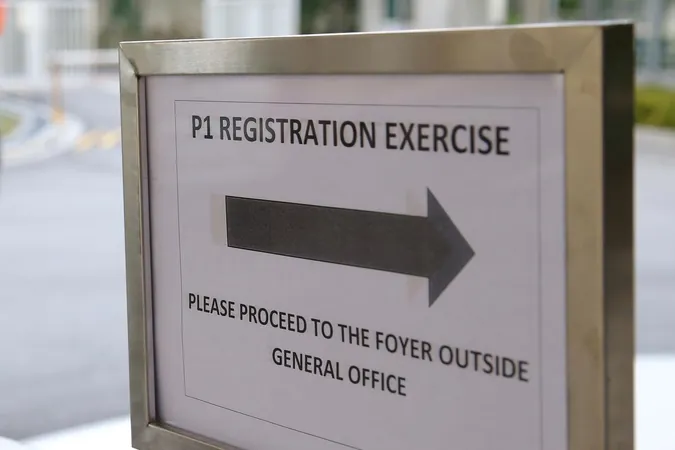
The Rising Trend of False Addresses in P1 Registrations: A Race to Secure Your Child’s Future
2025-06-13
Author: Ming
A Growing Problem in Singapore's School Registration System
In a startling trend, Singapore is witnessing a surge in parents providing false residential addresses during the Primary 1 (P1) registration process. Over the past five years, the number of such cases has skyrocketed, jumping from just one case a year before 2018 to an alarming average of nine per year from 2020 to 2024.
Caught Red-Handed: A Mother’s Deceptive Scheme
Recently, a 41-year-old woman was charged after lying about her home address to enroll her daughter in a coveted primary school. Court documents reveal that from June to September 2024, she misled school officials during the P1 registration exercise, reflecting a broader issue of compliance involving parents seeking an advantageous position for their children.
MOE Takes Action: The Stance on False Information
The Ministry of Education (MOE) expressed its firm stance on this issue, stating that it views such dishonest practices seriously. The ministry stated that a mix of increased public awareness and rigorous school checks has contributed to the rise in reported cases.
The Cost of Deception: Enrolling with False Addresses
Under the P1 registration system, children benefiting from a new address must show proof of residence for a minimum of 30 months. Falsifying this information can lead to severe consequences, including the transfer of the child to a different school with available vacancies, leaving parents powerless in choosing a preferred institution.
The Real Estate Market Reacts: Housing Demand and School Proximity
This desperate race for primary school entry is profoundly impacting Singapore's housing market. Real estate agents, like Grace Cheong, have noted how the annual P1 registration creates a unique demand for homes within 1km of prestigious schools. Parents are willing to make significant housing decisions, sometimes compromising on space and amenities, just to secure a spot near top-tier educational institutions.
From Planning to Execution: Families Strategize Early
Increasingly, parents are beginning their housing search long before their children reach primary school age. Reports indicate that some families start planning as early as the birth of their child, emphasizing the intense pressure to secure a place in sought-after schools.
Personal Stories: Parents Going the Extra Mile
One mother, who prefers to be identified as Mrs. Cheng, downscaled her home to be within close proximity to Anglo-Chinese School (Junior) to ensure her son received a more accommodating educational environment. Similarly, other families recount their strategic moves based on school reputation, affordability, and overall suitability.
A Reflection of Our Educational System’s Pressures
While many parents aim to give their children a competitive edge in education, the lengths they go to—such as uprooting their lives—illustrate a system that heavily prioritizes proximity to popular schools. The ongoing demand not only shapes the real estate landscape but also raises questions about how educational policies can influence family dynamics.
Conclusion: The Challenge Ahead for MOE and Singapore's Housing Market
As the demand for quality education continues to rise, so too does the urge among parents to find any advantage in the P1 registration process. This ongoing phenomenon reflects deeper issues within the educational framework and the corresponding real estate market, posing challenges for policymakers and families alike.



 Brasil (PT)
Brasil (PT)
 Canada (EN)
Canada (EN)
 Chile (ES)
Chile (ES)
 Česko (CS)
Česko (CS)
 대한민국 (KO)
대한민국 (KO)
 España (ES)
España (ES)
 France (FR)
France (FR)
 Hong Kong (EN)
Hong Kong (EN)
 Italia (IT)
Italia (IT)
 日本 (JA)
日本 (JA)
 Magyarország (HU)
Magyarország (HU)
 Norge (NO)
Norge (NO)
 Polska (PL)
Polska (PL)
 Schweiz (DE)
Schweiz (DE)
 Singapore (EN)
Singapore (EN)
 Sverige (SV)
Sverige (SV)
 Suomi (FI)
Suomi (FI)
 Türkiye (TR)
Türkiye (TR)
 الإمارات العربية المتحدة (AR)
الإمارات العربية المتحدة (AR)